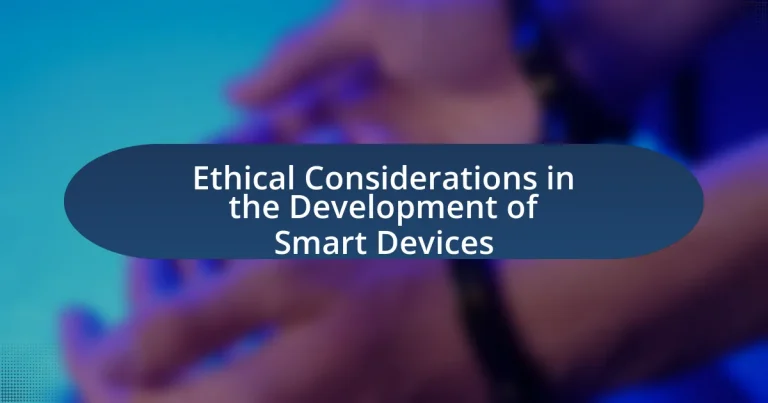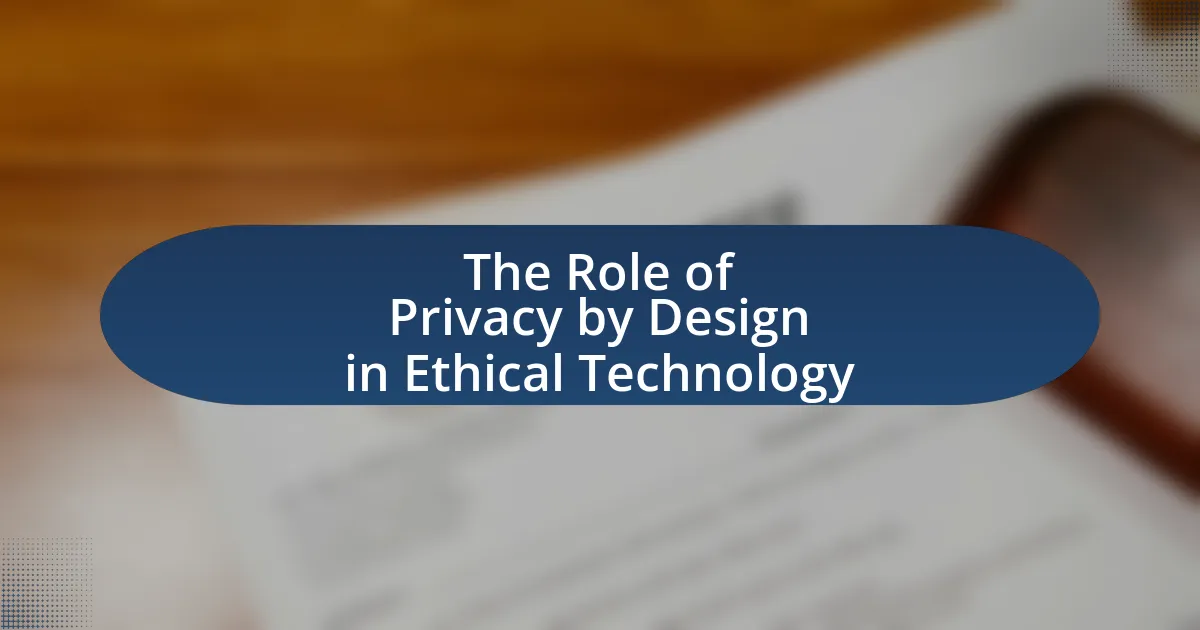The article focuses on the ethical considerations in the development of smart devices, emphasizing key issues such as privacy, security, and user consent. It highlights the importance of ethical guidelines to protect user data and foster trust between consumers and manufacturers. The discussion includes the ethical dilemmas faced during the design phase, the impact of regulations like the General Data Protection Regulation (GDPR), and the implications of unethical practices on consumers and society. Additionally, it outlines best practices for developers to ensure ethical standards are upheld in the rapidly evolving landscape of smart technology.

What are the Ethical Considerations in the Development of Smart Devices?
The ethical considerations in the development of smart devices include privacy, security, and user consent. Privacy concerns arise from the collection and storage of personal data, as smart devices often gather sensitive information about users’ habits and preferences. Security is critical, as vulnerabilities in smart devices can lead to unauthorized access and data breaches, potentially harming users. User consent is essential, as developers must ensure that users are fully informed about data collection practices and have the option to opt-in or opt-out. According to a 2021 study by the Pew Research Center, 81% of Americans feel that the potential risks of data collection by companies outweigh the benefits, highlighting the importance of addressing these ethical issues in smart device development.
Why is ethics important in the context of smart devices?
Ethics is important in the context of smart devices because it ensures the protection of user privacy, security, and autonomy. Smart devices often collect vast amounts of personal data, and ethical guidelines help to govern how this data is used, stored, and shared. For instance, the General Data Protection Regulation (GDPR) in Europe mandates that companies must obtain explicit consent from users before processing their data, highlighting the ethical obligation to respect individual rights. Additionally, ethical considerations can prevent misuse of technology, such as surveillance or manipulation, thereby fostering trust between consumers and manufacturers.
What ethical dilemmas arise during the design phase of smart devices?
During the design phase of smart devices, ethical dilemmas primarily include privacy concerns, data security, and user consent. Designers must navigate the challenge of collecting user data for functionality while ensuring that individuals’ privacy is respected. For instance, the integration of sensors and cameras can lead to unauthorized surveillance, raising ethical questions about user consent and the potential for misuse of data. Additionally, the design process often involves balancing innovation with the responsibility to protect sensitive information, as breaches can have significant consequences for users. These dilemmas highlight the need for ethical frameworks that guide the development of smart devices, ensuring that user rights are prioritized alongside technological advancement.
How do ethical considerations impact user trust in smart devices?
Ethical considerations significantly impact user trust in smart devices by influencing perceptions of privacy, security, and transparency. When companies prioritize ethical practices, such as data protection and user consent, users are more likely to trust the devices they use. For instance, a survey by the Pew Research Center found that 81% of respondents felt that the potential risks of data collection by smart devices outweighed the benefits, highlighting the importance of ethical data handling. Furthermore, ethical lapses, such as data breaches or misuse of personal information, can lead to a substantial decline in user trust, as evidenced by incidents like the Cambridge Analytica scandal, which resulted in a loss of trust in Facebook’s data practices. Thus, ethical considerations are crucial in fostering and maintaining user trust in smart devices.
What are the key ethical principles relevant to smart device development?
The key ethical principles relevant to smart device development include privacy, security, transparency, and user autonomy. Privacy ensures that user data is collected and handled with consent, protecting individuals from unauthorized access. Security involves implementing robust measures to safeguard devices and data from breaches, as evidenced by the increasing number of cyberattacks targeting smart devices. Transparency requires clear communication about data usage and device functionalities, allowing users to make informed decisions. User autonomy emphasizes empowering individuals to control their data and device settings, aligning with ethical standards in technology development. These principles are essential for fostering trust and accountability in the rapidly evolving landscape of smart devices.
How does privacy play a role in the ethical development of smart devices?
Privacy is crucial in the ethical development of smart devices as it ensures user data protection and fosters trust between consumers and manufacturers. Ethical development mandates that companies prioritize user privacy by implementing robust data protection measures, such as encryption and anonymization, to prevent unauthorized access and misuse of personal information. According to a 2021 survey by the Pew Research Center, 81% of Americans feel that the potential risks of companies collecting their personal data outweigh the benefits, highlighting the importance of privacy in consumer acceptance of smart technology. Thus, prioritizing privacy not only aligns with ethical standards but also enhances user confidence and market viability for smart devices.
What is the significance of data security in smart device ethics?
Data security is crucial in smart device ethics because it protects user privacy and prevents unauthorized access to sensitive information. The proliferation of smart devices has led to increased data collection, making it essential to implement robust security measures to safeguard personal data from breaches and misuse. According to a 2021 report by the Identity Theft Resource Center, data breaches in the technology sector increased by 17% compared to the previous year, highlighting the urgent need for ethical standards in data security. Ensuring data security not only fosters user trust but also aligns with ethical principles that prioritize the protection of individual rights in the digital age.
How do regulations influence ethical considerations in smart device development?
Regulations significantly influence ethical considerations in smart device development by establishing legal frameworks that dictate acceptable practices regarding user privacy, data security, and product safety. For instance, the General Data Protection Regulation (GDPR) in the European Union mandates that companies must obtain explicit consent from users before collecting personal data, thereby promoting ethical standards around user autonomy and transparency. Additionally, regulations often require manufacturers to implement robust security measures to protect user data from breaches, which aligns with ethical obligations to safeguard consumer information. These legal requirements compel developers to prioritize ethical considerations in their design and operational processes, ensuring that smart devices are not only innovative but also responsible and trustworthy.
What are the current regulations governing smart device ethics?
Current regulations governing smart device ethics primarily include the General Data Protection Regulation (GDPR) in the European Union, which mandates data protection and privacy for individuals. Additionally, the California Consumer Privacy Act (CCPA) establishes rights for consumers regarding their personal data in the United States. These regulations require manufacturers to ensure transparency in data collection, obtain user consent, and implement security measures to protect user information. Compliance with these laws is essential for companies developing smart devices to avoid legal penalties and maintain consumer trust.
How do these regulations affect innovation in smart device technology?
Regulations significantly impact innovation in smart device technology by imposing compliance requirements that can slow down development processes. For instance, stringent data privacy laws, such as the General Data Protection Regulation (GDPR) in Europe, necessitate that companies invest in robust data protection measures, which can divert resources from innovative projects. Additionally, regulations may limit the types of technologies that can be developed or deployed, as seen with restrictions on facial recognition technology in various jurisdictions, thereby stifling potential advancements in smart devices. These regulatory frameworks aim to protect consumers and ensure ethical practices, but they can also create barriers that hinder rapid technological progress and the introduction of new features in smart devices.
What are the implications of unethical practices in smart device development?
Unethical practices in smart device development can lead to significant privacy violations, security vulnerabilities, and consumer distrust. For instance, the unauthorized collection and misuse of personal data can result in identity theft and financial fraud, as evidenced by incidents like the Cambridge Analytica scandal, where data from millions of Facebook users was exploited without consent. Additionally, unethical practices can compromise device security, making them susceptible to hacking, which can endanger users’ safety and lead to breaches of sensitive information. The long-term implications include regulatory backlash, as seen with the General Data Protection Regulation (GDPR) in Europe, which imposes heavy fines on companies that fail to protect user data. Ultimately, these unethical practices undermine the integrity of the technology industry and erode consumer confidence, impacting market viability and innovation.
What are the potential consequences for companies that ignore ethical standards?
Companies that ignore ethical standards may face severe consequences, including legal repercussions, reputational damage, and financial losses. Legal repercussions can arise from violations of regulations, leading to fines and lawsuits; for instance, the Federal Trade Commission has penalized companies for deceptive practices. Reputational damage can result in loss of consumer trust, as seen with companies like Volkswagen during the emissions scandal, which led to a significant decline in sales and brand loyalty. Financial losses can manifest through decreased stock prices and increased operational costs due to the need for crisis management and compliance measures. Overall, neglecting ethical standards can jeopardize a company’s long-term viability and success.
How can unethical practices affect consumers and society at large?
Unethical practices can significantly harm consumers and society by eroding trust, compromising safety, and perpetuating inequality. For instance, when companies engage in deceptive marketing or fail to protect user data, consumers may suffer financial losses or privacy violations. A study by the Pew Research Center found that 81% of Americans feel they have little to no control over the data collected about them, highlighting the widespread concern over data privacy. Additionally, unethical labor practices in the production of smart devices can lead to exploitation and poor working conditions, affecting societal well-being. The International Labour Organization reports that 152 million children are engaged in child labor, often in industries linked to technology manufacturing. Thus, unethical practices not only impact individual consumers but also contribute to broader societal issues, including distrust in technology and economic disparity.
How can developers ensure ethical practices in smart device development?
Developers can ensure ethical practices in smart device development by implementing transparent data collection policies and prioritizing user privacy. Transparency involves clearly communicating what data is collected, how it is used, and obtaining informed consent from users. Prioritizing user privacy includes employing strong encryption methods and minimizing data retention to protect user information. Research indicates that 79% of consumers are concerned about how their data is used, highlighting the importance of ethical practices in fostering user trust and compliance with regulations like GDPR.
What best practices should developers follow to uphold ethical standards?
Developers should prioritize user privacy, ensure data security, and promote transparency to uphold ethical standards. By implementing robust encryption methods and adhering to data protection regulations, developers can safeguard user information from unauthorized access. Additionally, providing clear and accessible privacy policies helps users understand how their data is collected and used, fostering trust. Research indicates that 79% of consumers are concerned about how their data is used, highlighting the importance of transparency in ethical development practices. Furthermore, engaging in regular ethical training and adhering to established ethical guidelines, such as the ACM Code of Ethics, reinforces a commitment to responsible development.
How can user feedback be integrated into ethical development processes?
User feedback can be integrated into ethical development processes by establishing structured channels for collecting, analyzing, and implementing user insights throughout the development lifecycle. This integration ensures that user perspectives inform design decisions, enhancing the ethical alignment of smart devices with user needs and societal values. For instance, iterative design methodologies, such as Agile, emphasize continuous user involvement, allowing developers to adapt features based on real-time feedback. Research indicates that involving users in the design process can lead to products that better meet ethical standards and user expectations, as evidenced by studies showing improved user satisfaction and trust when feedback mechanisms are effectively utilized.
What future trends may impact ethical considerations in smart devices?
Future trends that may impact ethical considerations in smart devices include advancements in artificial intelligence, increased data privacy regulations, and the rise of the Internet of Things (IoT). As artificial intelligence becomes more integrated into smart devices, ethical dilemmas surrounding decision-making autonomy and bias in algorithms will intensify. Increased data privacy regulations, such as the General Data Protection Regulation (GDPR) in Europe, will compel manufacturers to prioritize user consent and data protection, reshaping how data is collected and utilized. The expansion of IoT will lead to more interconnected devices, raising concerns about security vulnerabilities and the potential for surveillance, necessitating a reevaluation of ethical standards in device design and deployment.
How might advancements in AI influence ethical standards in smart devices?
Advancements in AI are likely to elevate ethical standards in smart devices by necessitating greater transparency, accountability, and user privacy. As AI systems become more integrated into smart devices, the complexity of their decision-making processes increases, prompting the need for clear ethical guidelines to govern their use. For instance, the implementation of AI algorithms that can learn from user behavior raises concerns about data privacy and consent, which ethical standards must address to protect users. Furthermore, regulatory bodies are increasingly focusing on AI ethics, as seen in the European Union’s proposed AI Act, which aims to establish a framework for the responsible use of AI technologies. This regulatory push reflects a growing recognition of the need for ethical standards that ensure AI systems operate fairly and transparently, ultimately influencing how smart devices are developed and deployed.
What role will consumer awareness play in shaping ethical practices?
Consumer awareness will significantly influence the development of ethical practices in the smart device industry. As consumers become more informed about issues such as data privacy, environmental impact, and labor practices, they are more likely to demand transparency and accountability from manufacturers. For instance, a 2021 survey by the International Data Corporation found that 79% of consumers are concerned about how their data is used, prompting companies to adopt stricter data protection measures. This heightened awareness drives businesses to implement ethical standards and practices to meet consumer expectations, ultimately shaping the industry’s approach to ethical considerations.
What practical steps can developers take to address ethical concerns in smart devices?
Developers can address ethical concerns in smart devices by implementing robust data privacy measures, ensuring transparency in data usage, and incorporating user consent protocols. By utilizing encryption techniques, developers can protect user data from unauthorized access, which is crucial given that 81% of consumers feel they have lost control over their personal information (Pew Research Center, 2019). Additionally, developers should provide clear and accessible privacy policies that outline how data is collected, used, and shared, fostering trust among users. Implementing opt-in consent mechanisms allows users to make informed choices about their data, aligning with ethical standards and regulations such as the General Data Protection Regulation (GDPR). These steps collectively enhance user trust and promote ethical practices in the development of smart devices.





